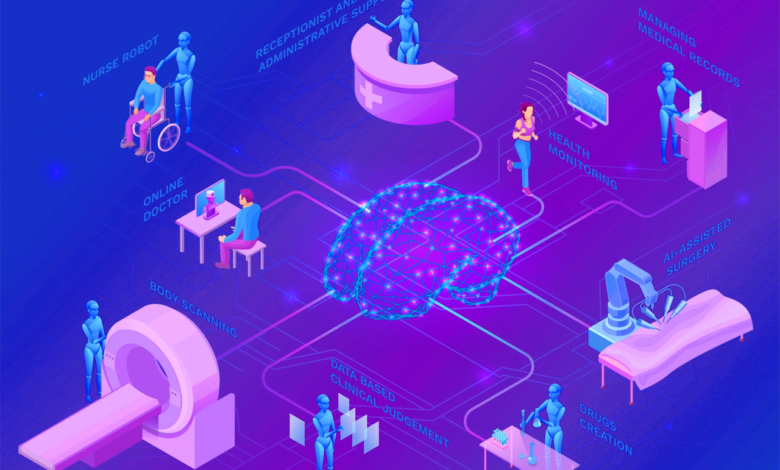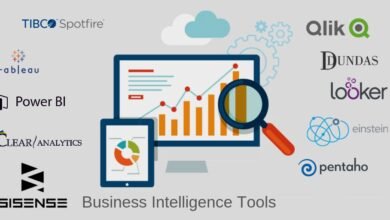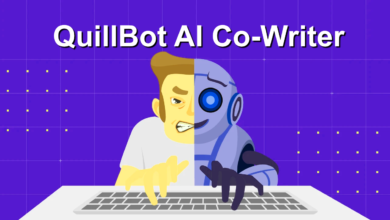What is the Role of Artificial Intelligence in Healthcare

Artificial intelligence (AI) is becoming increasingly prevalent in modern industry and daily life, as well as in healthcare. AI in healthcare can assist healthcare providers with a variety of patient care and administrative chores, allowing them to enhance existing solutions and address problems more quickly. Although the vast majority of AI and healthcare technologies are advantageous in the healthcare industry, support strategies for hospitals and other healthcare organizations may vary considerably.
Disease diagnosis and treatment have been at the forefront of AI in healthcare for the past 50 years. However, they were not superior to humans at making diagnoses, and their integration with clinical procedures and health record systems was subpar.
Related: 5 Artificial Intelligence Growth Strategies for Startups
In many areas of this ecosystem, AI can increase precision, accuracy, and outcomes while decreasing time. In the healthcare system, it can also assist with laboratory diagnostics, clinical diagnosis, imaging analysis, research studies, financial administration, documentation, and workflow simplification. AI approaches such as machine learning (ML), deep learning (DL), and natural language processing are utilized in the healthcare industry (NLP).
Medicine is a constantly evolving, dynamic field devoted to enhancing patient care. A well-functioning healthcare ecosystem includes hospitals, hospital management, physicians, nurses, frontline healthcare workers, insurance companies, pathology laboratories, radiology, pharmacy, pharmaceutical businesses, and research, among many other components.
The type of data to be evaluated determines the deployment of various AI technologies in the healthcare sector. The sources of healthcare data are healthcare providers, insurance companies, pharmaceutical corporations, and research institutions. There are two forms of data: structured data and unstructured data. Structured data are reliable and well-organized (for example, blood glucose values of patients taking part in a research study). Moreover, unstructured data is unreliable and might vary greatly from one another (for example, human language, imaging, and signals such as ECG). After plotting it on a correct chronology, eliminating biases, and translating it into a format that the accompanying AI application can comprehend, the data is ready to be used to train the associated AI model.
In healthcare, AI provides a vast array of management applications. In-patient care is more revolutionary than AI in the medical environment. AI simultaneously saves time and money in hospital administration. Billing, clinical documentation, revenue cycle management, and medical record administration are applications of AI in healthcare.
A further application of AI in healthcare claims and payment administration is machine learning, which may be used to match data across many databases. For instance, insurers and providers must verify the veracity of the millions of daily claims submitted. Detecting and correcting coding errors and fraudulent claims saves all parties time, money, and resources.
Related: How to Empower Public Relations with Artificial Intelligence
The most difficult obstacle for artificial intelligence in healthcare is ensuring its adoption in daily clinical practice, not whether the technologies are capable enough to be useful. Eventually, clinicians may gravitate toward tasks that need uniquely human abilities and the highest level of cognition. Only medical experts who refuse to collaborate can miss the full potential of artificial intelligence.
The Challenges of Artificial Intelligence in Healthcare
The most crucial variables for a successful AI model are the quality, quantity, and type of data utilized to train and evaluate the models. With the continuing expansion of medical data, it is vital to utilize the most current and trustworthy data access methods. Additionally, it is vital to regularly update the model with new data. AI systems are limited to recognizing correlations. In addition, the model’s projected complicated linkages are frequently difficult to grasp.
The point is that artificial intelligence is well-established in healthcare. It is a matter of time and usage before something becomes a permanent component of the industry. It is the responsibility of all main players to ensure optimal utilization and continuous renewal to suit the sector’s different needs.











